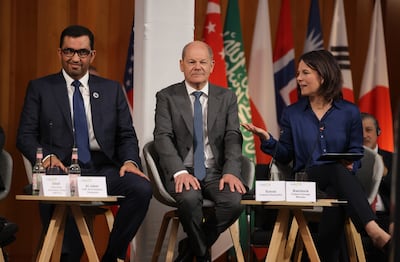Germany on Thursday pledged to help protect Iraq’s drinking water as Chancellor Olaf Scholz travelled to Africa with his sights on clean energy.
Berlin is to invest €62 million ($68.5 million) to shield water supplies in Iraq’s southern Muthanna province from the effects of climate change, Germany said after two of its senior officials visited the country.
It comes after a climate summit in Berlin heard calls to help the developing world tackle global warming.
A lack of clean water compounded by climate change is threatening livelihoods, public hygiene and food security in Iraq and other countries across the Middle East, as The National found in a special report.
Germany said on Thursday that its future development work with Iraq would focus more strongly on efforts to tackle climate change.
Iraq will put $15.9 million into the water project, which officials hope will ensure 130,000 people have access to clean water.
Germany said it would also support efforts by Iraq to end its dependence on oil as a source of energy and foreign income.
“Iraq is already suffering from heavy sandstorms, temperatures of more than 50°C and a shortage of drinking water,” said Jochen Flasbarth, a deputy minister in Germany’s Ministry for Economic Co-operation and Development.
“Climate change is threatening to destroy the development successes that Iraq has made in recent years. There could be new conflicts between population groups as a consequence.”
Delegates at this week's Petersberg Climate Dialogue in Berlin, part of preparations for the Cop28 climate change summit in the UAE, were told funding must be increased for poorer countries.
Dr Sultan Al Jaber, President-designate of Cop28 and the UAE's Minister of Industry and Advanced Technology, said developing countries were still waiting for the developed world to come good on a pledge of $100 billion in annual climate funding made more than a decade ago.
“In my meetings with climate, finance and development ministers across the Global South, what I hear time and again is that climate finance is simply not available, not accessible and not affordable,” Dr Al Jaber said.

Germany’s talks with Iraq also focused on migration, with plans for Berlin to relax its rules on labour migration in exchange for Iraq taking back more failed asylum seekers.
Mr Scholz, meanwhile, was expected to discuss clean energy projects during a trip to Kenya and Ethiopia that began on Thursday.
He will visit a geothermal power plant in Kenya, which Germany has spent €215 million to help fund. The site could one day be used to make green hydrogen.
Berlin wants Kenya to develop economically and use its position as a leading African economy to spur climate action on the continent, officials said.
But Germany also has a keen eye on using hydrogen to replace fossil fuels, especially after Russian gas supplies dried up.
The country is looking to imports from the Gulf, as well as potential providers in Africa.
“If one day the production of green hydrogen [in Kenya] is so extensive that Germany could be a potential importer, then of course that would be excellent for us,” a German official said.
“There’s no question about that, in keeping with the goal of diversifying our energy sources.”
Mr Scholz’s deputy Robert Habeck made similar comments in December on a trip to Namibia, a former German colony.

